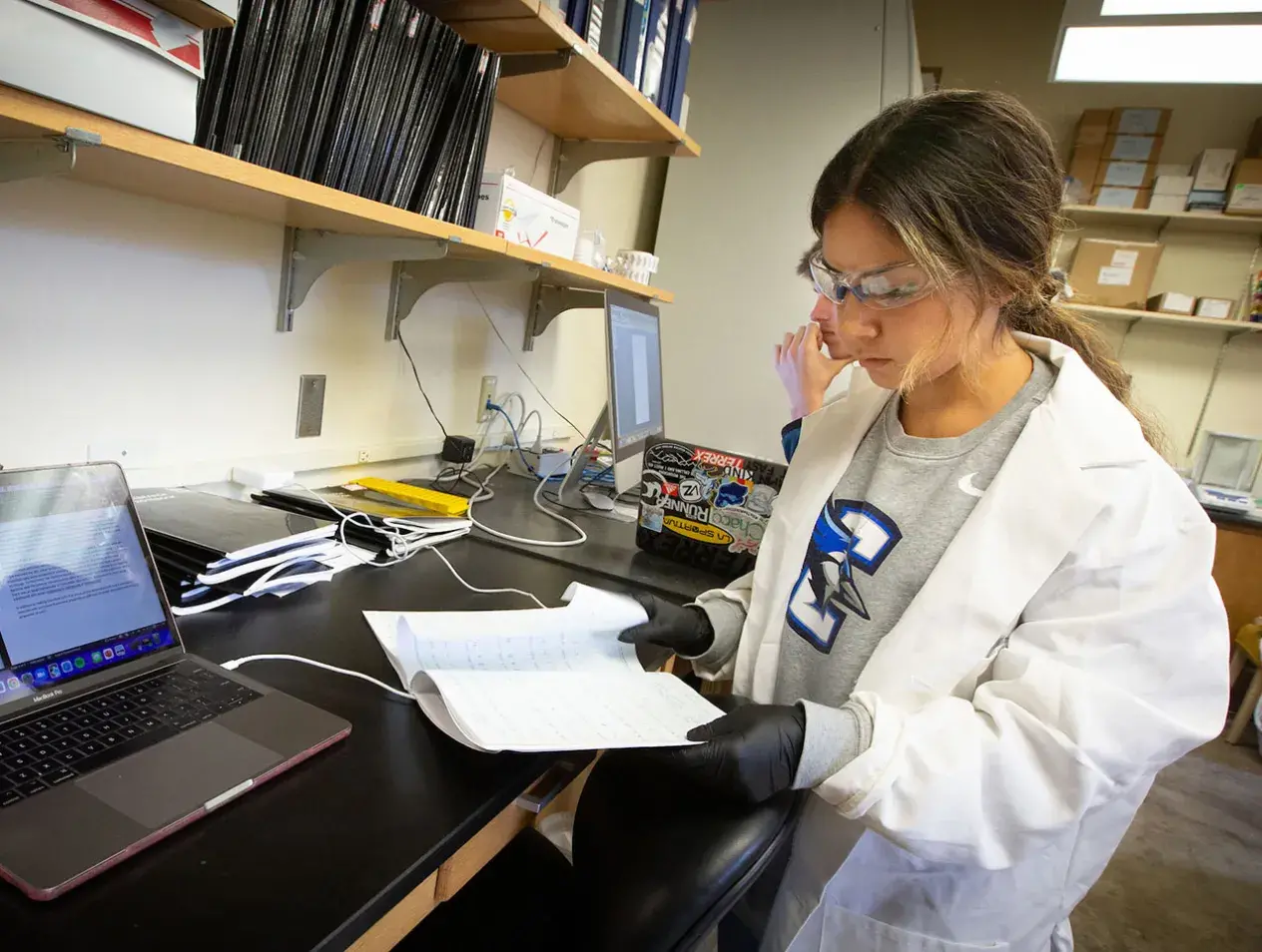
Lynch Cancer Research Center
About the Lynch Cancer Research Center
The Lynch Cancer Research Center exists to unify cancer research at Creighton University and to carry on the legacy that was created by Henry Lynch, MD.
Creighton’s cancer research spans many areas including endometrial, skin, blood, breast, colon, prostate, brain cancer and drug discovery and development.
Much of Creighton’s Cancer research incorporates collaborative teams of basic scientists and clinicians, allowing for cutting edge research aimed at improving patient care.

Research Areas
Women’s Cancers (Endometrial and Ovarian Cancer)
Colon Cancer
Chemotherapy-Induced Toxicities
Skin Cancer
Lung Cancer
Breast Cancer
Brain Cancer
Drug Discovery and Development
Head and Neck Cancer
Blood Cancers
Age Related Cancer Mechanisms
Biorepository of Lynch Legacy Samples
Prostate Cancer
Basic Science Director

Laura A. Hansen, PhD
- Associate Dean, Research
- 402.280.4085
- View Profile
Glossary
- Acquired mutation – This is a mutation that occurs in a particular cell. Once the mutation occurs it may be passed on to each successive generation of cells in the same organ or tissue, but it will not be passed on to offspring.
- Allelotyping – Analysis of the multiple changes in DNA.
- Atypical moles(dysplastic nevi) – Unusual or irregular, Moles whose appearance is differen from that of common moles. Dysplastic nevi are generally larger than ordinary moles and have irregular and indistinct borders. Their color frequently is not uniform and ranges from pink to dark brown; they usually are flat, but parts may be raised above the skin surface.
- Arzoxifene – a SERM (selective estrogen receptor modulator)
- Asymmetry – Not proportionally balanced; difference in size and shape.
- Autosomal dominant - A gene on one of the non-sex chromosomes that is always expressed, even if only one copy is present. The chance of passing the gene to offspring is 50% for each pregnancy.
- Biliary – Pertainting to the bile, to the bile ducts or to the gallbladder.
- Carcinogenesis – The generation of cancer from normal cells, correctly the formation of a carcinoma from epithelial cells.
- Chemoprevention – The use of natural or laboratory-made substances to prevent cancer.
- CLIA – Stands for Clinical Laboratory Improvement Amendments
- Clinical Breast Exam (CBE) – A clinical breast exam is the examination of your breasts typically performed by your physician, nurse or physician assistant. During the examination, the healthcare provider will visually exam your breasts for asymmetry and dimpling or puckering of the skin, They will also manually examine your breast covering the entire surface of the breasts and the underarm area.
- Colonoscopy – A colonoscopy requires a cleansing preparation of the colon the day before the procedure so that the colon can be fully visualized. This is usually accomplished by drinking a liquid that causes complete emptying of the colon. Immediately prior to the colonoscopy, sedation and an amnesiac are given so that most people sleep through the procedure or have no remembrance of it. The colonoscopy involves the insertion of a colonoscope (a long tube with a light at the end) into the rectum and passed the full length of the colon to the other end. This allows the physician to examine the entire colon both as the scope is inserted and as it is withdrawn.
- Colostomy (Intestinal Opening) – Surgical procedure that creates an opening on the abdomen (stroma) for the drainage of stool (feces) from the large intestine (colon). Usually done after a bowel resection. May be temporary or permanent.
- Cytologic – The study of cells and how they change.
- Distal – Remote, farther from any point of reference, opposite of proximal.
- Dysplastic nevi (atypical moles) - Moles whose appearance is different from that of common moles. Dysplastic nevi are generally larger than ordinary moles and have irregular and indistinct borders. Their color frequently is not uniform and ranges from pink to dark brown; they usually are flat, but parts may be raised above the skin surface.
- Etiology – The study of origins of disease
- Endometrial Screening – The risk of endometrial cancer (cancer of the lining of the uterus) for women with an HNPCC mutation may be as high as 60%. Women who have or are at 50% risk of having an HNPCC mutation should initiate endometrial cancer screening at age 30. The recommended screening procedures are annual endometrial aspiration and transvaginal ultrasound. An endometrial aspiration is performed by passing a very thin instrument through the cervical opening into the uterus and suctioning a small amount of fluid with cells from the lining of the uterus for evaluation.
- First degree relatives - are your mother, father sister, brother, daughter and son.
- Genotype – The constitution of the cell or DNA
- Heterogeneity – The condition or state of being different in kind or nature.
- Hematologic – pertaining to blood or blood forming tissues
- Hyperplasia - The abnormal multiplication or increase in the number of normal cells in normal arrangement in a tissue.
- HNPCC – Stands for hereditary nonpolyposis colon cancer
- High Risk – Persons with a first degree relative that has or had a syndrome specific cancer or is a mutation carrier.
- Informed Consent – A process (oral, written, or both) in which complete information regarding participation in a specific research protocol is presented to the subject or the subject’s legally authorized representative in understandable language. Such consent shall be sough under circumstances which provide the prospective subject or the representative sufficient opportunity to consider whether or not to participate and with no undue influence. No informed consent may include language which the subject or the representative is made to waive any of the subject’s legal rights or release the investigator, sponsor, institution or its agents from liability for negligence. In almost all instances, informed consent must be documented by use of a written consent form which has been approved by the Institutional Review Board (IRB) and signed by the subject or the subject’s legally authorized representative.
- Invasive Cancer – Cancer that has spread to surrounding tissue.
- Linkage Analysis – Study aimed at establishing linkage between genes.
- Malignancies – Cancers
- Marker – An identifiable physical location on a chromosome whose inheritance can be monitored. Markers can be expressed regions of DNA or some segment of DNA with no known coding function but whose patter of inheritance can be determined.
- Melanoma – A malignant tumor which arises from the pigment producing cells (melanomas) of the deeper layers of the skin (or the eye). Melanoma is the leading cause of death attributable to skin lesions. Described as an irregular dark skin lesion that may have areas of varying color. Often greater than 6mm in diameter.
- Mutation – A change in form, quality or some other characteristic.
- Pathogenic – Capable of causing a disease.
- Phenotypic – Characteristics of an organism displayed regardless of genotype
- Proband - individual in a family who initiates the family study.
- Prophylactic Mastectomy -. Also called preventive mastectomy, it is the surgical removal of one or both breasts to try to prevent or reduce the risk of breast cancer. It involves removal of as much of the at-risk tissue as possible.
- Prophylactic Oophorectomy - Also called preventive oophorectomy, it is the surgical removal of both ovaries (also known as bilateral prophylactic oophorectomy) to try to prevent or reduce the risk of both ovarian cancer and breast cancer.
- Sebaceous – Pertaining to or secreting, fat. Usually connected to hair follicles.
- Second degree relatives - are your grandmother, grandfather, grandchild, aunt, uncle, niece and nephew.
- Self Breast Exam – A self breast exam is the examination of one’s own breast. This should include both a visual and tactile component. Instructions for self breast exam can be found here
- Sequencing DNA – Determination of the order of nucleotides (base sequences) in a DNA molecule.
REMINDER: Research results should ALWAYS be clinically validated. Your medical team can direct you to clinical labs that can perform these tests. If you are in the Omaha NE area, our partners at CHI Health can help you at the Henry Lynch Cancer Center.
Contact Us
Call: 402.280.3774
Fax: 402.280.1734


